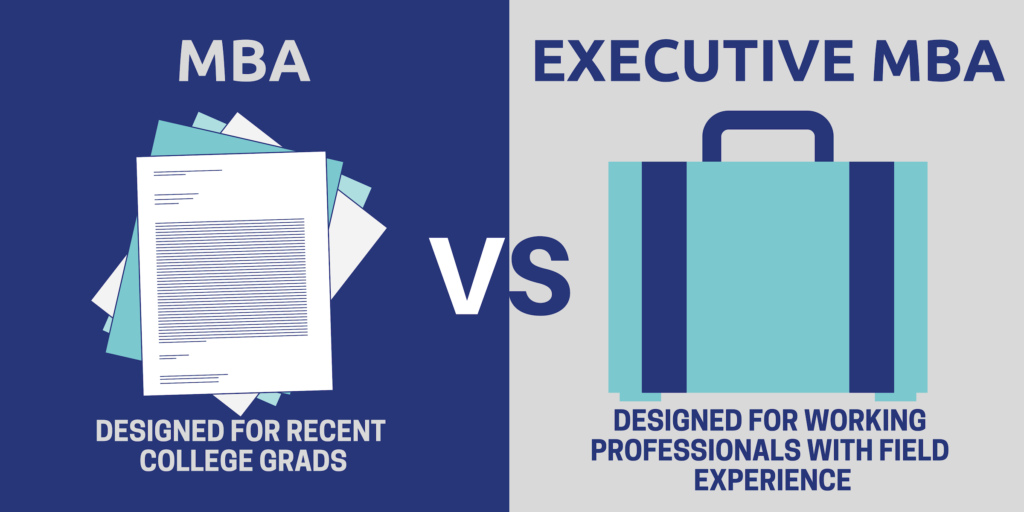Regular MBA programmes, on the other hand, are for recent graduates who are preparing to begin their managerial careers. Working professionals should not enrol in the full-time MBA programme because they must attend regular classes. The best aspect of the full-time MBA programmes is that students can participate in campus placements and have constant face-to-face interaction with knowledgeable teachers.
These courses include a variety of various characteristics for which you can choose one over the other, aside from the difference in the part-time and full-time study between EMBA and normal MBA. Having a full-time MBA gives you access to networking on a larger scale because you can participate in on-campus placements. You still can't conclude, though, because EMBA students are individuals who have professional experience and networks. The main goal of EMBA programmes is to educate working executives on new skills and refresh their existing ones.
However, neither an EMBA nor an MBA programme will guarantee you a successful career because your qualifications and knowledge are important.
A traditional MBA is a full-time on-campus programme, whereas an EMBA is a hybrid programme that offers both online and traditional classroom instruction. The EMBA classes are typically held on weekends or in the evenings so that executives who are employed can attend class and keep up with their careers.
The next comparison criterion is duration, with a standard full-time MBA taking two years to complete. An Executive MBA, on the other hand, can take anywhere between one and two years to complete. The Executive MBA program's length varies depending on the university. Some colleges provide a 1-year Executive MBA degree, while others have a 2.5-year curriculum.
The requirement for work experience is the most crucial comparative variable. Since the normal full-time MBA programme is designed specifically for recent graduates who want to work in the management industry, it does not require any prior work experience. However, to apply for admission to the Executive MBA programme, you must have at least two to three years of work experience.
Two other management programmes that primarily target working professionals are the Executive MBA and Distance MBA. These two courses were created specifically with professionals in the management field in mind. Nevertheless, these courses have different aspects of comparison.
While the time commitment for a traditional MBA is fixed at two years, that of a distance MBA can range from one to two and a half years. Additionally, executive MBA programmes allow executives to attend offline or on-campus classes while distance MBA programmes do not.
Candidates for the distance MBA programme do not need to be seasoned working professionals; recent grads can also apply. However, applicants for EMBA programmes must have at least 2-3 years of professional experience.
If you're trying to figure out which type of MBA is superior, the executive MBA is unquestionably the answer because it promotes networking, and if you enrol in this programme at a reputable institution like the IIMs, your degree will be of the maximum value.
Finally, a distance MBA programme is a full distance education that does not require you to attend a single class on campus. In contrast, EMBA programmes offer offline classes on campus.
Executive MBA programmes are frequently referred to as online MBA programmes, although these two programmes are very different. It is possible to earn a postgraduate degree entirely online through the online MBA programme. You will take all of the classes and tests for this course online. According to UGC norms, the only difference between an online MBA degree and a traditional MBA is online tests. Executive MBA programs, on the other hand, are hybrid programmes that are not entirely online.
The main advantage of EMBA programmes: is that, in most circumstances, companies will pay for your education, and even if they don't, you will still receive your full income while pursuing your MBA.
There is some variety in the duration, curriculum, prerequisites, standards, and goals of all EMBA programmes. A conventional MBA programme will be the greatest option for a recent graduate who can devote a full two years to education, hence the decision to award the badge of the best course to any MBA school is fairly arbitrary. Even better for placement is a normal MBA. Then, for working executives who are in the middle of their careers and wish to brush up on their current skills while learning new ones, an EMBA programme is the best or only option. The next one is a distance and online MBA programme, which is a recognised degree programme that is currently gaining enormous relevance.